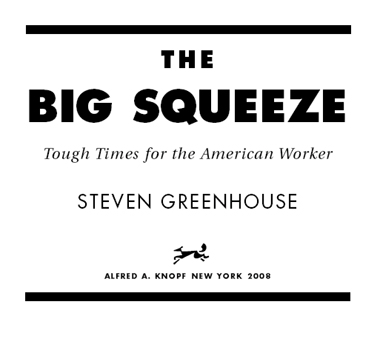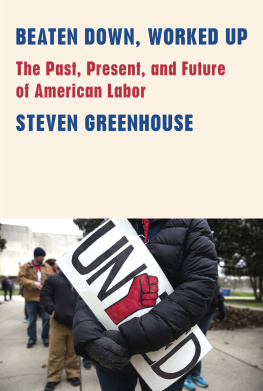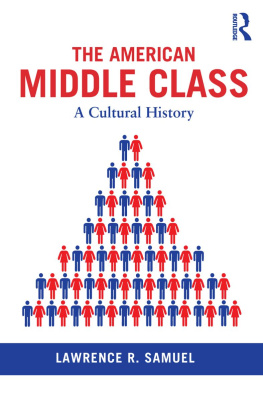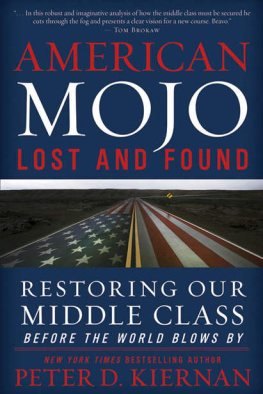

Contents
For my mother and father,
who dreamed of a fairer world,
and
for Miriam,
my favorite American worker
The test of our progress is not whether we add more to the abundance of those who have much; it is whether we provide enough for those who have too little.
FRANKLIN DELANO ROOSEVELT, 1937
Second Inaugural Address
I keep a puttin and a puttin out
I keep sweatin like all get out
I work so long that Im a losin track
Waitin, waitin on the big payback.
BRUCE SPRINGSTEEN, The Big Payback
Introduction
Not long after I began peering inside the nations workplaces as labor correspondent for the New York Times, I was taken aback by what I often found theresqualid treatment, humbling indignities, relentless penny-pinching. The United States may see itself as the City on the Hill, but many of its citizens labor in dismal swamps. Why, I kept asking myself, are there so many unseemly, even shocking things taking place inside the workplaces of the worlds richest nation?
I saw great corporations that literally locked employees in their workplace at night, that cheated employees by improperly deleting hours from their time records, that cut employees pensions in half, that suddenly fired longtime employees and gave them thirty minutes to vacate the premises. One company fired a computer engineer on Take Your Daughters to Work Day as his eight-year-old daughter looked on, and a well-known retailer pink-slipped some workers because they earned fifty-one cents more an hour than the market rate. And then there were the respected multibillion-dollar corporations that hired subcontractors to do their dirty work, with the subcontractors paying many employees half the minimum wage and insisting that they work seven days a week, thirty days a month. One janitor in Houston told me: They treat us worse than animals.
We all know our own workplaces, but how many of us know what goes on inside a meatpacking plant, a Wal-Mart on the midnight shift, or a corporate office after thousands of layoffs have been announced? In this book, Ive aimed to provide a view inside those and other workplaces, and in doing so, I will highlight many unseemly things but also some admirable ones.
This is a decade during which the American economy has thrived by many measures, with corporate profits and CEO salaries soaring, yet wages have languished for most workers, and health and pension coverage has grown worse. Companies are increasingly treating job security as an anachronism, and corporate executives continue to send many good middle-class jobs overseas. Yes, some jobs must move abroad for competitiveness, but it would be foolish not to examine the impact that this has had on American society. Nothing comes without a price.
This book seeks to explain what is happening in the American economy and in the American workplacein part through the stories of individual, representative workers. Ive examined how workers have been squeezed by powerful trends coursing through the economy: the offshoring of white-collar jobs, the Wal-Mart effect, the steeper climb for young workers, the decline of organized labor, the exodus of factories to Mexico and China, the growing power imbalance between management and worker. In an effort to explain these trends, I go beyond the tales of individual workers to weave in analysishistorical, economic, sociologicalof such issues as evolving management practices and the weakening of the nations social safety net. As I complete this book in the winter of 2008, the United States appears on the brink of a recession, possibly a deep one. As a result, many of the problems I write about, such as declining job security and the squeeze on wages, may grow only worse in the coming months.
Many Americans devote more hours to working than to any other activity. It is important therefore that work be a source of fulfillment and dignity. Indeed, both the Old and New Testaments have strong language about the dignity of labor and the moral obligation to treat even the humblest worker fairly and with respect. Proverbs teaches us, He who oppresses a poor man insults his Maker. And Deuteronomy cautions: You shall not abuse a needy and destitute laborer, whether a fellow countryman or a stranger in one of the communities of your land.
Over the years I have interviewed thousands of workerssteelworkers and strawberry pickers, Microsoft whizzes and minimum-wage waitressesand a handful of their faces and tales stick most vividly in my mind. One worker whose story nags at me is Michael Johnson, a father of five who has worked for seventeen years as a security guard in downtown Los Angeles. Johnson is an engaging, earnest man who has come a long way from his days as a drug addict. Now he wants nothing more than to be a good father and to provide his five children with what they need to thrive. He is proud that his three oldest sing in the youth choir at Victory Baptist Church, yet he wishes that he could afford dance lessons and piano lessons for them. When I first met Johnson in the summer of 2006, his big problem was that his security jobhe is the post commander in the main lobby of a downtown office towerpaid him just ten dollars an hour. On that salary, about all Johnson can afford is his $975 monthly rent and food for his family. To pay for everything elseutilities, gasoline, car repairs, payments on his 1998 Nissan Quest, clothes for the kids, and furnishings for their gloomy two-bedroom apartmentJohnson took a second full-time job guarding a construction site in L.A.s northern suburbs. His wife, Denesha, cant work because she hurt her back badly while lifting a 270-pound patient when she was a nursing home aide. One of Johnsons many frustrations is that when he took his second job, the state kicked his family off food stamps. He was told he earns too much.
Each morning Johnson gets up at 5:20 and leaves for work at 6:15, before his children wake up. After putting in eight hours at one job and seven at the other, he returns home just before eleven at night, after his children have gone to sleep. Im missing them grow up, he says. I cant do this forever.1
Johnsons story nags at me because it shows that something fundamental is not working. That is exactly why I wrote this book.

Chapter One
WORKED OVER AND OVERWORKED
In his job at a Wal-Mart in Texas, Mike Michell was responsible for catching shoplifters, and he was good at it, too, catching 180 in one two-year period. But one afternoon things went wildly awry when he chased a thiefa woman using stolen checksinto the parking lot. She jumped into her car, and her accomplice gunned the accelerator, slamming the car into Michell and sending him to the hospital with a broken kneecap, a badly torn shoulder, and two herniated disks. Michell was so devoted to Wal-Mart that he somehow returned to work the next day, but a few weeks later he told his boss that he needed surgery on his knee. He was fired soon afterward, apparently as part of a strategy to dismiss workers whose injuries run up Wal-Marts workers comp bills.1

Immediately after serving in the army, Dawn Eubanks took a seven-dollar-an-hour job at a call center in Florida. Some days she was told to clock in just two or three hours, and some days she was not allowed to clock in during her whole eight-hour shift. The call centers managers warned the workers that if they went home, even though they werent allowed to clock in, they would be viewed as having quit.
Next page









